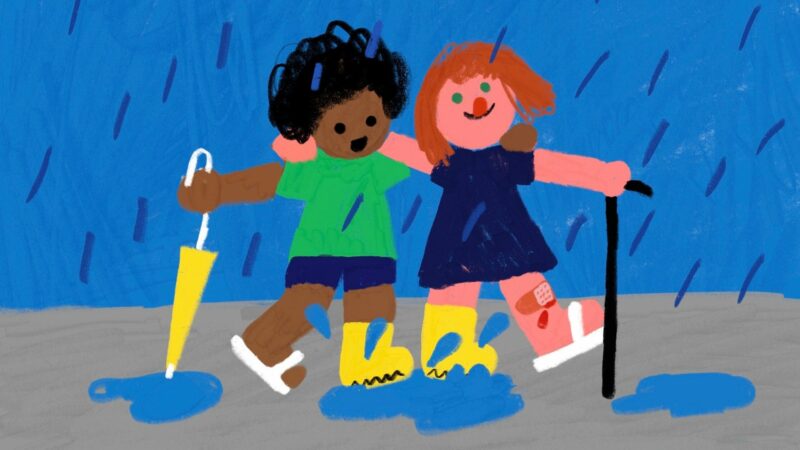Illustration by: Joanne Liu
Rarely is there an event that affects all children, parents, and families around the globe. When the pandemic first hit, I was curious as to what the experience looks like for different families. So, I interviewed families residing across eight different cities and four different continents. One question I asked was, “What are one or two qualities that you would like to instill in your children during this time?” Every parent mentioned either empathy or compassion.
What is Empathy and Compassion?
Empathy is the ability to understand and experience the feelings, thoughts, and experiences of another person. It involves being able to (1) think in someone else’s shoes, typically known as perspective taking and (2) share those same emotions.
Compassion comprises of “com” (which means together) and “passion” (which means suffering), literally meaning “to suffer together.” While compassion and empathy are related, some argue that compassion goes one step further to include the desire to help.
Shifting From Me to Us
The pandemic and the recent racial protests highlight a renewed effort to embrace an orientation that moves from being me-focused to other-focused, as Dr. Pamela King pointed out in her earlier post. This is against the backdrop of a decrease in perspective taking and empathic concern, and an increase in narcissism among college students over the last decade. The general decline in other-focused traits coincide with this “Generation Me” that values self-confidence, self-assertion, and individualism.
Empathy and compassion mark a shift from “me” to “us.” These are not traits that we are born with; rather, they are skills that can be cultivated over time. Similar to learning a new skill, like playing the piano or swimming, the more we practice, the better we are. But, it requires intentionality. Here are some ways that parents can cultivate empathy and compassion in their children.
1. Talk about their feelings.
Empathy and compassion, by definition, involve comprehension of emotions. The fundamental step is to cultivate emotion literacy in your child. Start when they are little; encourage them to be in touch with their own feelings by helping them name their emotions. “Do you feel disappointed, angry, or a little bit of both, when you can no longer see your friends every day?” Emotions are typically one-word descriptions. Here are some examples. As they grow, you can introduce more complex emotional states such as jealousy, embarrassment, and pride.
2. Respect and validate their feelings.
Once you help your child identify their feelings, validate them. Some parents may feel uneasy with emotions like sadness or anger, and would want to distract their child to make them feel happier. While it may help in the moment, it sends an implicit message that those emotions are inappropriate, which goes against fostering empathy and compassion. Instead, parents can strive to create a safe space where all emotions are respected and the child is allowed to express however they feel. In our household, we use phrases like, “it makes sense why you are sad,” or “I know you are upset,” or “you have the right to feel angry, but you do not have the right to hit.” The more we empathize with our child, the more they learn to show empathy to others.
3. Cultivate perspective taking skills.
Practice recognizing and understanding the feelings of another person. Young children are egocentric by nature. As they develop, they learn that the world does not revolve around them, and that others are entitled to feelings that may be different from theirs. Stories or movies are an excellent way to cultivate perspective taking skills. When you are reading a story together, ask how the different characters feel in different situations. What are their needs, feelings, and perspectives?
4. Encourage different viewpoints.
Children have concrete thinking and tend to see things as black-or-white. But real-life issues are often complex and multi-faceted in nature. (There is rarely a clear “right answer”.) As your child develops their moral compass, you can help them keep in mind other viewpoints by asking questions. “Can you imagine why someone would make a decision that is different than yours?” “Why do you think he chose to do this?” “Can you think of a time when you knew something was wrong but you went ahead and did it?” “What does fairness look like in this situation?” These questions can be explored during story time, or for older children, when talking about current news. It is best to keep these discussions organic, rather than forced. Offer plenty of opportunities to expose your child to age-appropriate news and ask curiously and inductively. When in doubt, stick to open-ended questions.
5. Help children regulate their emotions or distress.
For some children, being empathic can take up a great deal of emotional energy, which can get in the way of enacting help. They feel so personally invested that they may be paralyzed by the distress they feel. For those children, they may need extra help with processing or regulating their feelings. This may include helping them differentiate between things that are within their control versus things that are not, and focusing on what they can change, setting up more realistic expectations, or helping them manage setbacks and disappointments.
6. Expose your child to people/experiences that are different from theirs.
We tend to befriend and spend time with people who are most similar to us. We talk to people who usually share our viewpoints. We end up creating an echo chamber that reinforces our ideas or assumptions about “others.” That further creates a division between “us” versus “them.” If we are to fully put ourselves into someone else’s shoes, we need to go out of our comfort zone and meet people whose worldview or life experiences are vastly different than our own. Volunteering is a good way to learn, to listen, and build friendships.
Continue Exploring

Resilience
Building Family Resilience
Can studying missionary families teach us about building resilience in our own families? Thrive Fellow, Abby Schmidt explains her findings.

Practices
A Practice: Courageous & Curious Conversations toward Mutuality
When seeking mutuality in relationships, courageous and curious conversations are necessary. Here's a practice to guide you.

Practices
Power Dynamics in Relationships
Power dynamics affect how we engage with our loved ones. Learn how to get curious and courageous to develop mutuality in relationships.
